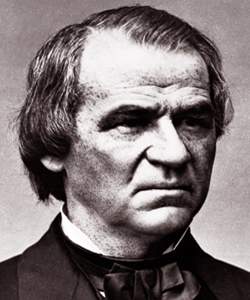Andrew Johnson (Congressional Biographical Directory)
Reference
JOHNSON, Andrew, (father-in-law of David Trotter Patterson), a Representative and a Senator from Tennessee and a Vice President and 17th President of the United States; born in Raleigh, N.C., on December 29, 1808; self-educated; at the age of 13 was apprenticed to a tailor; moved to Tennessee in 1826; employed as a tailor; alderman of Greeneville, Tenn., 1828-1830; mayor of Greeneville 1834-1838; member, State house of representatives 1835-1837, 1839-1841; elected to the State senate in 1841; elected as a Democrat to the Twenty-eighth and to the four succeeding Congresses (March 4, 1843-March 3, 1853); chairman, Committee on Public Expenditures (Thirty-first and Thirty-second Congresses); did not seek renomination, having become a gubernatorial candidate; Governor of Tennessee 1853-1857; elected as a Democrat to the United States Senate and served from October 8, 1857, to March 4, 1862, when he resigned; chairman, Committee to Audit and Control the Contingent Expenses (Thirty-sixth Congress), Committee on the District of Columbia (Thirty-sixth Congress); appointed by President Abraham Lincoln Military Governor of Tennessee in 1862; elected Vice President of the United States on the Republican ticket with Abraham Lincoln in 1864 and was inaugurated on March 4, 1865; became President of the United States on April 15, 1865, upon the death of Abraham Lincoln; wide differences arising between the President and the Congress, a resolution for his impeachment passed the House of Representatives on February 24, 1868; eleven articles were set out in the resolution and the trial before the Senate lasted three months, at the conclusion of which he was acquitted (May 26, 1868) by a vote of thirty-five for conviction to nineteen for acquittal, the necessary two-thirds vote for impeachment not having been obtained; retired to his home in Tennessee upon the expiration of the presidential term, March 3, 1869; unsuccessful candidate for election to the United States Senate in 1869 and to the House of Representatives in 1872; elected as a Democrat to the United States Senate and served from March 4, 1875, until his death near Elizabethton, Carter County, Tenn., July 31, 1875; interment in the Andrew Johnson National Cemetery, Greeneville, Greene County, Tenn.
“Johnson, Andrew,” Biographical Directory of the United States Congress, 1774 to Present, http://bioguide.congress.gov/scripts/biodisplay.pl?index=j000116.
Andrew Johnson (American National Biography)
Scholarship
The election of Abraham Lincoln and the subsequent secession crisis confronted Johnson with a difficult choice. Should he, like other Tennessee Democrats, uphold southern pretentions, or should he declare his Unionism, a position more popular among the opposition in East Tennessee than among his own party associates? Johnson never hesitated; fully convinced that the Union must be preserved and knowing that there would be no future for him in a southern Confederacy dominated by men like Jefferson Davis, whom he had fought for years, he defied the southern mainstream. After introducing constitutional amendments calling for the direct election of presidents, limitation of the terms of Supreme Court justices, and the division of the remaining territories between free and slave states, on 18-19 December 1860, in a ringing Senate speech in support of these amendments, he called secession treason and demanded that the government enforce the Constitution and the laws. Although he never said that states could be coerced--he wanted individuals to be held to their obedience--he was denounced as a traitor throughout the South. But in the North he became a hero, and his reputation was not diminished by two more antisecession speeches on 5-6 February and 2 March 1861.
Hans L. Trefousse, "Johnson, Andrew," American National Biography Online, February 2000, http://www.anb.org/articles/04/04-00566.html.





















































